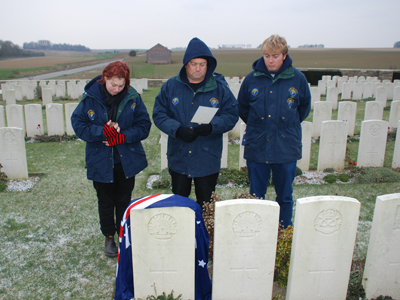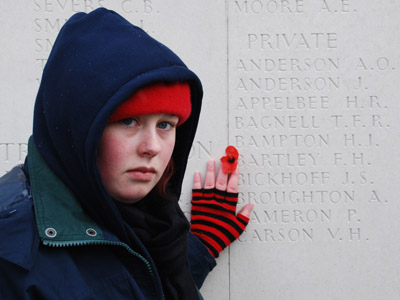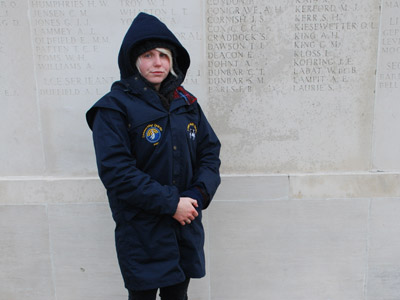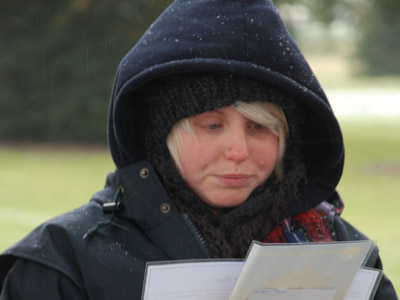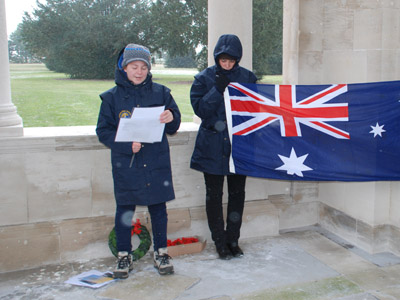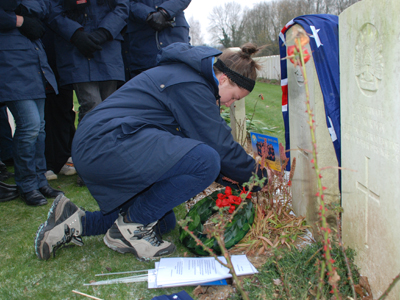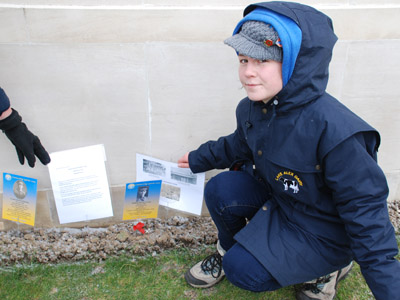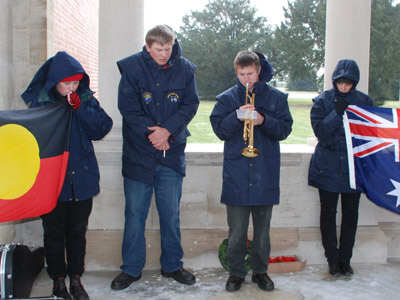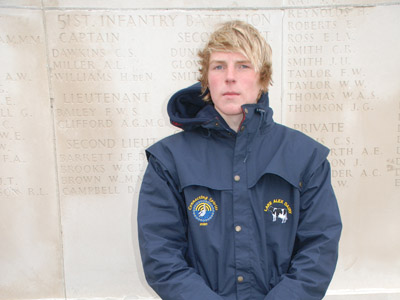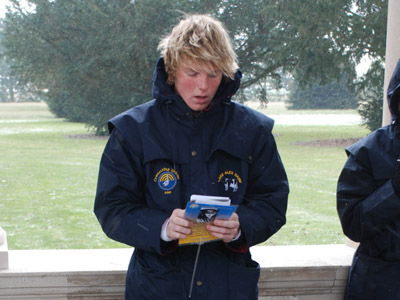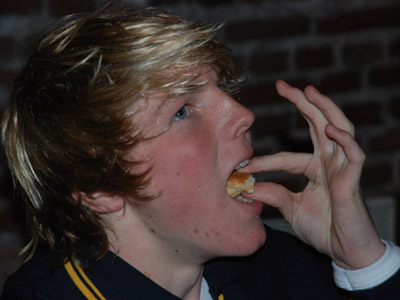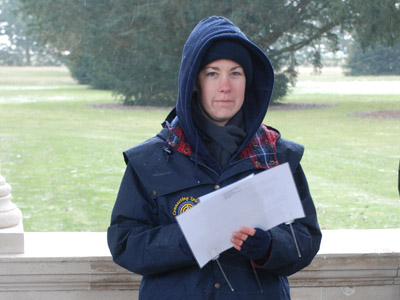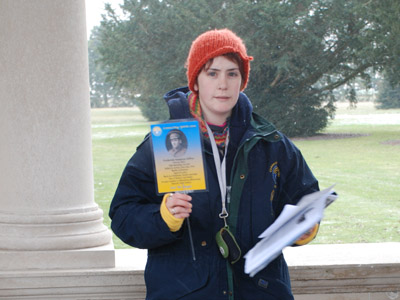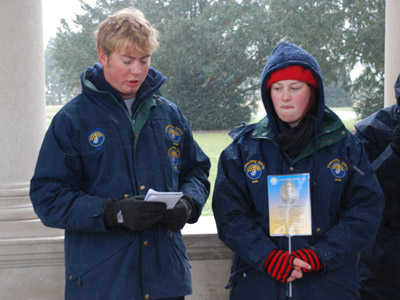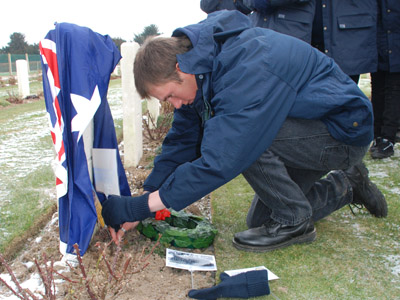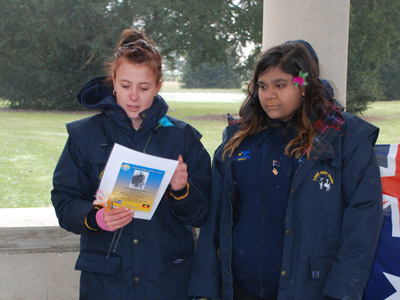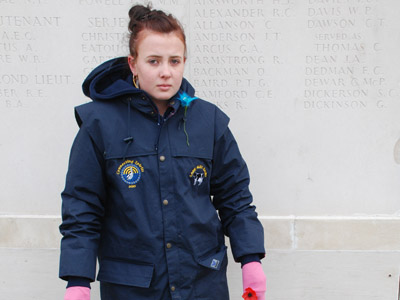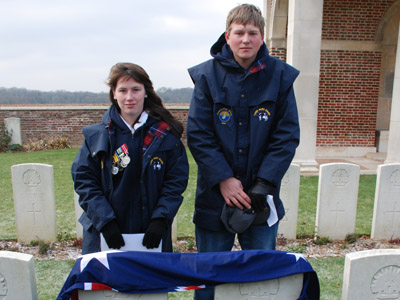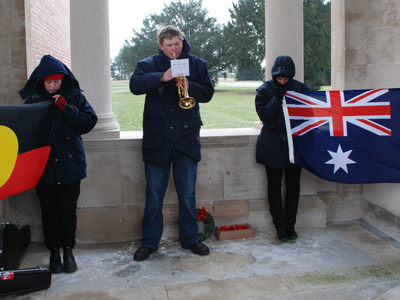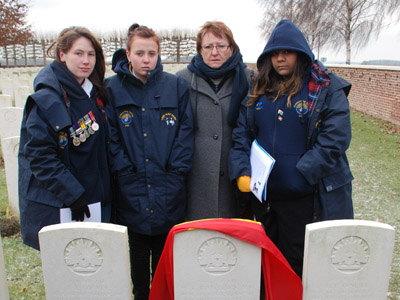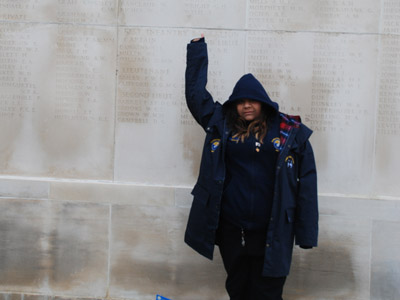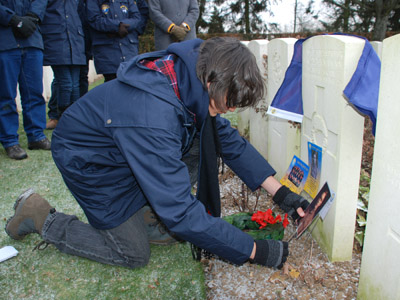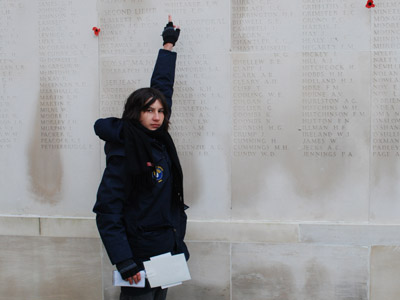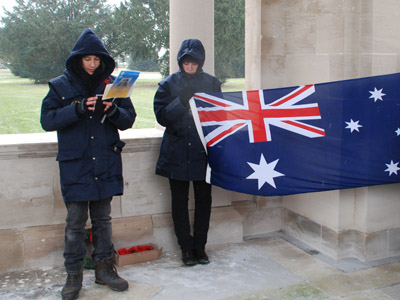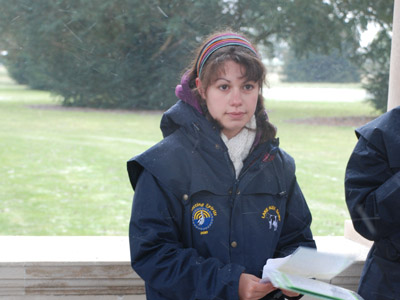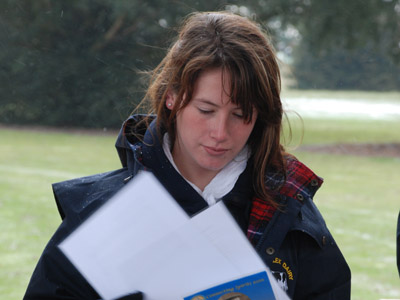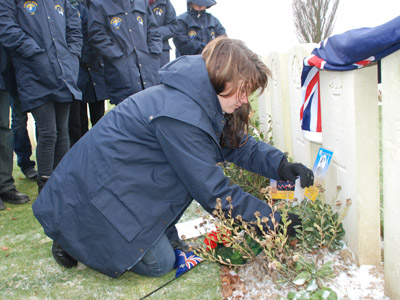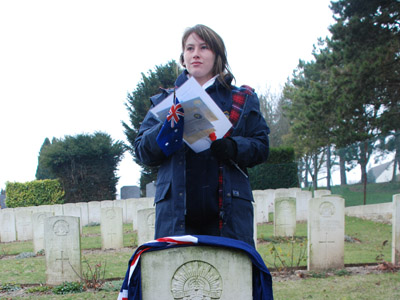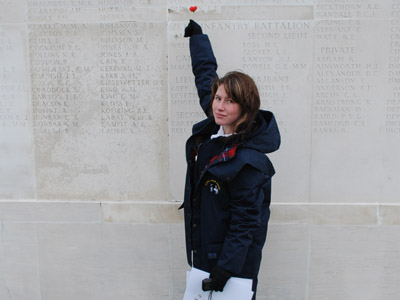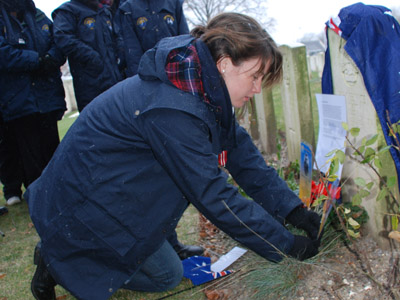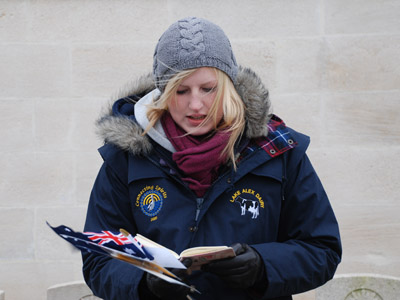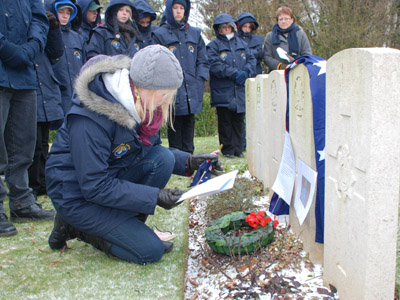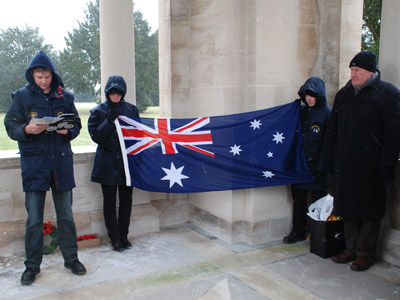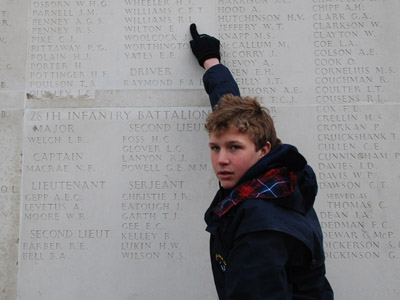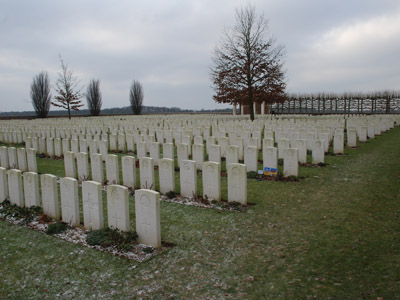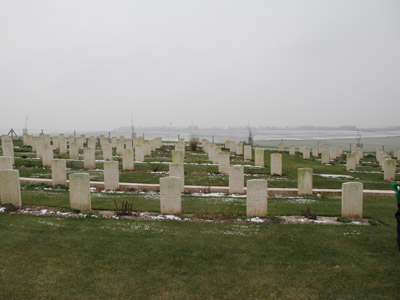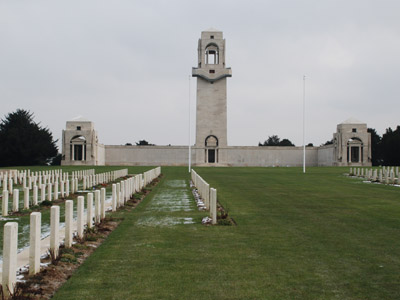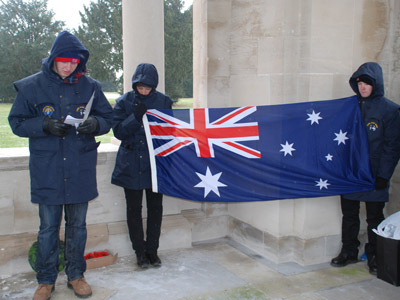Dec 1
DAY TWELVE: AMIENS WEDNESDAY DECEMBER 1
The day started with a light moment as Jules came down for breakfast. She said "Good Morning" to all of us sitting at one table and then put her hands on the shoulders of some random Frenchmen whose look suggested that he thought his luck had changed. Only then did Jules realise that it wasn't Mal but we are in France after all!!! (Inserted by Mal at Richard's Request)
Well the weather is just getting worse. The forecast was for a high of 5 below zero and minus 7 low with a wind chill factor added in for good luck. The kids were better prepared for the ravages of the cold but knowing that we would have a service at Villers -Bretonneux and commemorate 19 soldiers, I knew it would be our greatest challenge so far. The first cemetery was at Corbie and as we drove around the village, the wind blew the powdery snow across the roads. Molly had yet another commemoration of a Thomas Smith, a man of German background, who, like many of his fellow German Australians, changed his name at the start of the war to avoid the harassment that befell so many during the war. These ‘Enemy Aliens’, as they were named by an act of parliament, had either been born in Australia or were naturalized citizens but for many this did not protect them from being marginalized during the time of the war.
From Corbie at was off to Villers-Bretonneux and the Australian National Memorial for one of our major commemorative experiences. Covered in ice and snow, the grounds leading up to the memorial were like a winter wonderland. I had never seen VB like this before and never experienced such bone aching temperatures. How would these kids pull it off? Unlike previous years we decided not to stand in front of the memorial but to the side in a slightly more protected part but even there the wind puffed the powdery snow onto and around us. For over an hour each person who had a commemoration did their deliveries with an earnest sincerity that was so heart -warming. There were many of the kids who had relatives as well just adding to the depth of feeling we all held onto. So many powerful moments: Flo sobbing through her dedication to Jeffery, a former teacher at Blumberg District School (now Birdwood High), little Lachy Jennings speaking of his great, great uncle in loving terms, Cass who spoke of the Page family and the loss they felt, Katie and Hayley proudly wearing their Ngarrindjeri feather flowers and then Jack and Chris playing the Last Post in the depths of the arctic freeze….and both lads clearly gaining in confidence and WANTING to do this! The magic moment of big brother Hayden hugging his younger sibling, Chris, and warmly congratulating his brother on his trumpet playing. Those are just some of the beautiful aspects of all that was our VB ceremony today. I got them back on the coach in silence where Flo read a letter to home written by Jeffery and then I played 3 songs from the first Connecting Spirits CD : Rita’s “20th century Catastrophe “, Flo’s “Commemoration Story” and Rita’s song “God be with you until we meet again”. While playing their music I asked the kids to reflect on the service by writing what first came into their minds…poems…prose…narrative….whatever felt right. Here are their responses:
OLIVER CROSSMAN
Remembering the soldiers who were torn apart
Sadness begins to fill the heart
Listening to each soldier’s story
Ones of pain and ones of glory
They will live on forever
In the fields of France
Where the wind blows
And the poppies dance.
LINA CARBONE
Doing William’s commemoration today was very different because he did not have a grave. He is most probably no- where near here, he’s probably at Pozieres. Also his brief casualty record from enlistment to death was a year yet he only has about five lines recorded. How do men just slip through the cracks like this? I know the French had to rebuild their lives but it gives me conflicting feelings knowing what they have built them on. As far as I know there are possibly men in the fields next to me now. I hope William and the others who are lost don’t feel forgotten – they never will be.
HAYDEN BIDDLE
Villers-Bretonneux was another moving ceremony. Seeing all the kids pouring their hearts out was something special. When Jack and Chris played the trumpet again I was so proud of them. All the kids were freezing yet they all paid the soldiers the respect they deserve. I also commemorated George Cole. I was unable to feel my toes or fingers. I now hope to get in touch with the Yankalilla RSL and give a presentation of all the soldiers I have commemorated.
LACHLAN JENNINGS
Standing there watching everyone freezing makes me think about how the soldiers had it when fighting in this area. Walking those couple of metres felt like forever. I wasn’t nervous, I just wanted to make my soldiers and family proud of me. I felt it welling up inside and the words just kept going even though I didn’t feel I was making them. After when I saw Roberts S.A on the wall, all thoughts went out of my mind and I thought it would be too much. Then I saw Jennings H.R under the 48th Battalion and I was overwhelmed once again to see two of my great uncles on the same wall. Sitting on the bus I think about the fact we share the same blood. This will NEVER be forgotten. Rest in peace my Great Uncles.
BETH JURGS
I felt so cold; bitterly cold and had a connection with the soldiers who had to fight in this weather with only the equipment they could carry. I do not understand how they could live and fight in these conditions.
DYLAN VAN DEN BRINK
At the site where our soldiers are laid
A harrowing example of past mistakes made.
To my brave soldier who died by the barrel of a gun
I hope it warms his lost soul
That he will always be remembered
At least by one.
MORGAN THOMSON
We always hear so much about the conditions the soldiers lived in. Whenever I heard of the cold, I related it to the cold I feel at home. But here in minus 4 degrees temperatures and not even being able to stick the cards into the ground because it was frozen. What those men endured is incomprehensible.
CHRIS BIDDLE
The Villers-Bretonneux memorial was larger than I expected. It makes me think of all the lost in the war.
JADE NEWMAN
It was amazing listening to Flo and Rita’s music I’ve heard so many times before. It’s only now after standing in the cold for over an hour, watching the emotional commemorations by the majority of the group that it makes sense. Seeing all the names of the brave men who fought for our today, and looking out over the headstones and know they’re all brothers, fathers and friends some barely older than me, I can now finally understand the inspiration behind the music. Their music is a beautiful reflection on these young men’s lives.
JACK APPELKAMP
This trip has changed me in many ways. For a start I now have a personal meaning of what it means to be an Australian and how proud I am of these men. They gave everything for this soil!
CHELSEA WEST
Amazing how the headstones stand
Line by line
Row by row
A reflection of the horror
We may never know.
A reminder ….
A memory of what they fought for
“Their name liveth for evermore.”
Am back in my warm hotel room finishing this off and feeling very content with what we achieved today. It was a hard and demanding day for everyone but one that will be etched into these kids psyche and memory banks for a long, long time. Have been working on the blog up to 1.00 am this morning then up at 6.00 to finish it. The kids wrote so much today and volunteered lots of pages, to keep up I typed on the bus while we drove home. Proudly announced that I had caught up all the days then our beloved driver yelled out….’Write more kids!!!!! So she isn’t up to date!” Grrrrrrrrrrrrrr Mr. Wardle!!!! If you are enjoying the blogs send us an email via my address reecy@chariot.net.au
EMMA BLOOMFIELD
Today I commemorated Leo King at the Villers-Bretonneux memorial. I was amazed at the enormity of the wall and how one place could hold so many names of men with unknown graves just from this area. After spending our time at the memorial it got me thinking about all those names so I wrote this poem dedicated to all those men.
So many names upon a wall
All in columns row on row
And it is not known where they lie
Only that all these men fought and died.
From across our wide brown land
They came to fight
For the mother’s country’s name
Now they rest their duty done.
Fathers , brothers and sons
All remembered as one.
LEST WE FORGET
CASS NEALE
I got to know the Page family really well by reading diaries of Ernest’s brother talking about him. This helped me gain more information about Ernest but also made me feel more connected to him. I think this was why it was so hard to keep my emotion in: it just took control. I felt I was getting lost in the words I was saying but now that I have done this I have a feeling of closure.
JACK APPELKAMP
Today when I did my commemoration Molly had one in the same cemetery. When we found their graves, the soil they were resting in was shared: they lie side by side. These two men were Corporal Hugh Bawden and Lance Corporal Thomas Edward Rhue. We later realized they would have worked together and maybe could have been mates. This on top of the fact that Thomas is my great, great uncle overwhelmed me in a way that I probably won’t ever experience again.
After our service at Villers-Bretonneux we continued to commemorate solidiers at a variety of cemeteries, with a stop at Peronne for a look through a museum and lunch in a huge room that used to be a store for the old castle. As we travelled further we moved through the final days of Australia's involvement in the war. Heath Cemetery mostly held the remains of men who died during the opening day of the Battle of Amiens, which was known as the Black Day of the German Army, and in subsequent operations in that area during August 1918. The Australians reached Peronne in the early days of September and the commeorations there were of men who were killed at that time. Each new cemetery was for dates later in September, and finally Heinrich Pumpa, who lost his life on the 3rd October, just 2 days before the final Australian Infantry action of the war. As we travelled we goty closer to the Hindenburg Line, the last real line of defence left to the German Army before reaching the border. Our final stop for the day was at Bellicourt New British Cemetery. This is the cemetery where the Jurgs family has chosen a grave of an unknown Australian soldier as the symbolic grave of Frank Bartley. In the first trip in 2006, Mal felt that a name on a memorial many kilometres from where Frank was killed was not the end of the journey. Hamish and he chose this grave as it would probably be where Frank was buried if his remains were recovered, and was only a kilometer from where he was killed. In each trip since they have left tributes to Frank there. Bellicourt is on a tunnel that runs over the St Quentin Canal, and it was this tunnel that was used as a focus for the attcak on te Hindenburg Line on the 29th September 1918.That was the day that Frank was hit by a shell and killed. In the past we have walked along the canal to the tunnel as it is a beautiful walk and the fact that the canal was built by hand by political prisoners during the reign of Napolean gives it even more atmosphere. Unfortunately the weather and time were against us this time.
Bethany Jurgs
I decided to place an echidna at the grave that we have adopted for Uncle Frank. I did this because I wanted to bring Frank a piece of Australia. The echidna represents my feelings toward the Australian soldiers. The strong protective spikes represent the soldiers fighting to protect the soft inner body of the echidna which represents the people of Australia.
|
|
